Homework Helpers: Basic Math and Pre-Algebra
HOMEWORK HELPERS
Basic Math and Pre-Algebra
By
Denise Szecsei

Copyright 2011 by Denise Szecsei
All rights reserved under the Pan-American and International Copyright Conventions. This book may not be reproduced, in whole or in part, in any form or by any means electronic or mechanical, including photocopying, recording, or by any information storage and retrieval system now known or hereafter invented, without written permission from the publisher, The Career Press.
HOMEWORK HELPERS: BASIC MATH AND PRE-ALGEBRA
TYPESET BY EILEEN MUNSON
Printed in the U.S.A.
To order this title, please call toll-free 1-800-CAREER-1 (NJ and Canada: 201-848-0310) to order using VISA or MasterCard, or for further information on books from Career Press.

The Career Press
220 West Parkway, Unit 12
Pompton Plains, NJ 07444
www.careerpress.com
Library of Congress Cataloging-in-Publication Data
Szecsei, Denise.
Homework helpers. Basic math and algebra / by Denise Szecsei
p. cm.
Includes index.
ISBN 978-1-60163-168-8ISBN 978-1-60163-658-4 (ebook) 1. Mathematics. 2. MathematicsProblems, exercises, etc. I. Title. II. Title: Basic math and algebra
QA39.3.S94 2011
510dc22
2010054620
Acknowledgments
Writing a book is a labor-intensive process, not only for the author, but for everyone else involved, directly and indirectly, with the project. This book would not have been completed without the help of a special group of people.
I would like to thank Michael Pye, Kristen Parkes, and everyone else at Career Press who helped transform these mathematical ideas into the object you are now holding. I am most appreciative of the efforts of Jessica Faust, who coordinated things throughout the process.
I am fortunate to be part of the faculty at Stetson University. It is because of the encouragement of the University and my department that I can take the time to write about my favorite subject and hopefully make it one of yours. Stetson Universitys commitment to education is manifested by the support given to me throughout this process.
Kendelyn Michaels played a pivotal role throughout this project. Because of her thorough reading of the manuscript, I was able to clarify some sections and improve on my explanations. This book would not have been the same without her influence.
Alic Szecsei was in charge of finding all of the typographical errors in the manuscript and checking over my solutions. Writing this book was actually a ruse to get him to solve more math problems.
Thanks to my family for their help throughout the writing and editing stages. The deadline for this manuscript was just before the holidays, and their presents will reflect the time and effort they put into helping me complete this project.
CONTENTS
PREFACE
Welcome to Homework Helpers Basic Math and Pre-Algebra!
Math. One word that, when spoken, can invoke extreme reactions of dread and terror. Most people would rather fight an alien invasion than work out a math problem. In this day and age, working out math problems is more common than fighting alien invasions, so, although it is advantageous to be prepared for an alien attack, you will derive more benefit from developing your math skills.
When children first start learning about numbers, it is fun. Counting things, such as the number of candles on a birthday cake or the number of presents under the tree, is exciting. There is a feeling of accomplishment in being able to count higher and faster than anyone else. But then, something changes.
Math stops being a game and starts to become serious. Getting the right answer becomes important, especially when it involves receiving the correct change from a twenty. Balancing a checkbook, calculating the finance charges on a credit card balance, figuring out the price of an item on sale, and budgeting your monthly expenses can take all of the fun out of working with numbers, but you cant let that stop you from developing the skills necessary to function in our number-centered world.
In this book, I try to hit on the major ideas behind working with numbers, but I start with basic calculations. After you are comfortable adding, subtracting, multiplying, and dividing numbers, you will be ready to solve more interesting problems. As you gain your confidence, I will touch on some of the topics that will prepare you to move on to the study of algebra. Algebra marks the transition from learning how to do basic calculations to being able to solve more complex problems. Im sure that the glimpse of algebra that you see in this book will get you exited about the prospect of learning more math.
Pre-algebra involves taking a step back from doing rote calculations and looking at the processes involved in those calculations. Mathematics is all about discovering patterns and pushing the limits to develop new methods for solving problems, and pre-algebra will give you a taste of more advanced problem-solving.
In this book, I also cover a little geometry. Geometry and pre-algebra go hand in hand, especially when trying to calculate answers to questions such as:
 How many sheets of plywood will you need to build a dog house?
How many sheets of plywood will you need to build a dog house?
 How many bundles of shingles will you need to re-roof your house?
How many bundles of shingles will you need to re-roof your house?
 How much money will it cost to tile your dining room?
How much money will it cost to tile your dining room?
I dont have a particularly problematic life, yet I find that I use the techniques discussed in this book to solve problems on a daily basis. And thats not just because I teach math! I enjoy using math to solve problems, and I usually turn situations where I use math into word problems to talk about in my classes. Word problems provide you (the reader) with a glimpse of how math can be used to solve problems that occur in everyday life. They also provide a creative outlet for math teachers.
I wrote this book with the hope that it will help anyone who is struggling to understand calculations using basic math or needs to have his or her math skills refreshed. Reading a math book can be a challenge, but I tried to use everyday language to explain the concepts being discussed. Looking at solutions to algebra problems can sometimes be confusing, so I tried to explain each of the steps I used from start to finish. Keep in mind that learning math is not a spectator sport. In this book, I have worked out many examples, and I have supplied practice problems at the end of most lessons. Work these problems out on your own as they come up, and check your answers against the solutions provided. Aside from any typographical errors on my part, our answers should match.
Perhaps you arent quite convinced that math isnt something to be feared. All I am asking you to do is give it a chance. Take a look at the first chapter, try some of the practice problems, and see what happens. Mathematics: The more you know, the better it gets!
1
Numbers
Almost every math book starts out by talking about numbers, and this book is no exception. Math and numbers go hand in hand. That is because numbers are symbols used in math in the same way that letters are symbols used in language. What better numbers to start with than the numbers we learn first: the counting numbers?
Next page

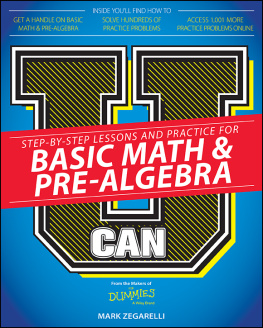
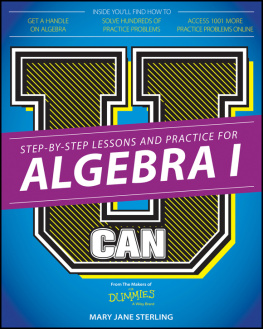
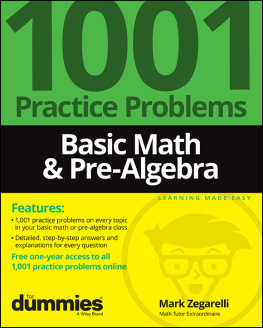
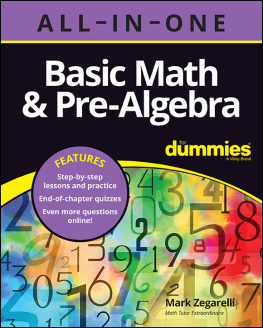
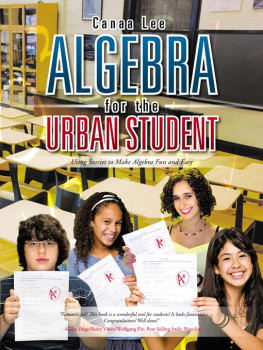
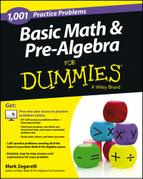
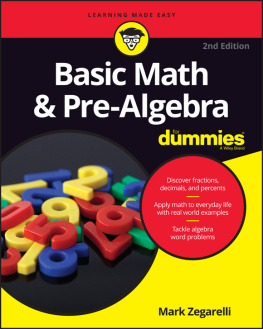
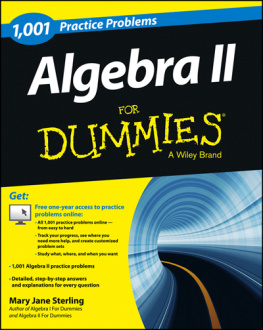
![Debra Anne Ross [Debra Anne Ross] - Master Math: Basic Math and Pre-Algebra](/uploads/posts/book/119083/thumbs/debra-anne-ross-debra-anne-ross-master-math.jpg)
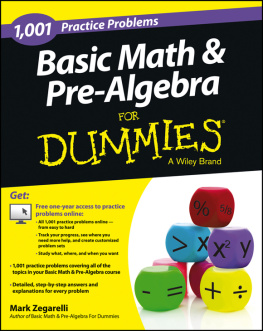


 How many sheets of plywood will you need to build a dog house?
How many sheets of plywood will you need to build a dog house?